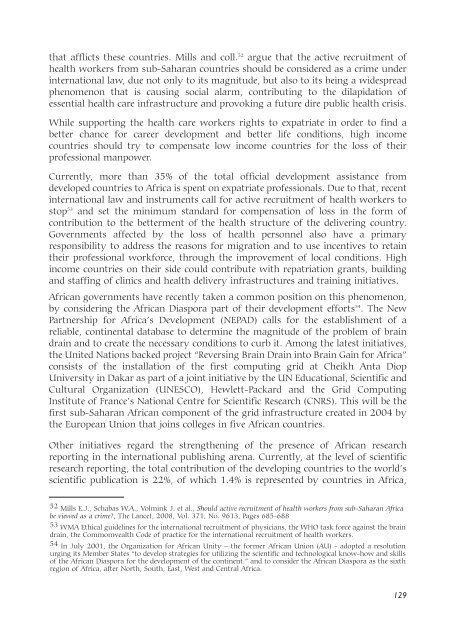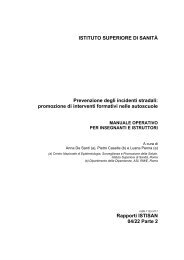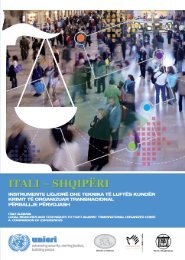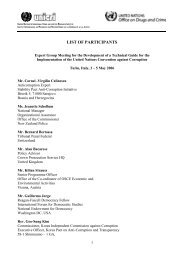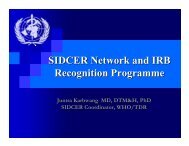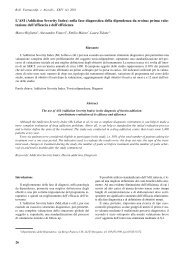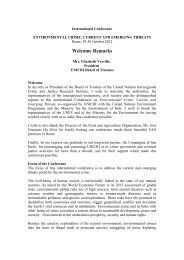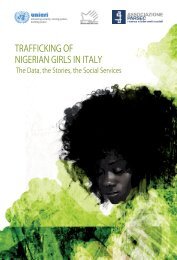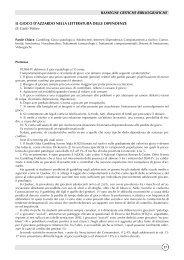Biomedical Research in Developing Countries - UNICRI
Biomedical Research in Developing Countries - UNICRI
Biomedical Research in Developing Countries - UNICRI
Create successful ePaper yourself
Turn your PDF publications into a flip-book with our unique Google optimized e-Paper software.
that afflicts these countries. Mills and coll. 52 argue that the active recruitment of<br />
health workers from sub-Saharan countries should be considered as a crime under<br />
<strong>in</strong>ternational law, due not only to its magnitude, but also to its be<strong>in</strong>g a widespread<br />
phenomenon that is caus<strong>in</strong>g social alarm, contribut<strong>in</strong>g to the dilapidation of<br />
essential health care <strong>in</strong>frastructure and provok<strong>in</strong>g a future dire public health crisis.<br />
While support<strong>in</strong>g the health care workers rights to expatriate <strong>in</strong> order to f<strong>in</strong>d a<br />
better chance for career development and better life conditions, high <strong>in</strong>come<br />
countries should try to compensate low <strong>in</strong>come countries for the loss of their<br />
professional manpower.<br />
Currently, more than 35% of the total official development assistance from<br />
developed countries to Africa is spent on expatriate professionals. Due to that, recent<br />
<strong>in</strong>ternational law and <strong>in</strong>struments call for active recruitment of health workers to<br />
stop 53 and set the m<strong>in</strong>imum standard for compensation of loss <strong>in</strong> the form of<br />
contribution to the betterment of the health structure of the deliver<strong>in</strong>g country.<br />
Governments affected by the loss of health personnel also have a primary<br />
responsibility to address the reasons for migration and to use <strong>in</strong>centives to reta<strong>in</strong><br />
their professional workforce, through the improvement of local conditions. High<br />
<strong>in</strong>come countries on their side could contribute with repatriation grants, build<strong>in</strong>g<br />
and staff<strong>in</strong>g of cl<strong>in</strong>ics and health delivery <strong>in</strong>frastructures and tra<strong>in</strong><strong>in</strong>g <strong>in</strong>itiatives.<br />
African governments have recently taken a common position on this phenomenon,<br />
by consider<strong>in</strong>g the African Diaspora part of their development efforts 54 . The New<br />
Partnership for Africa’s Development (NEPAD) calls for the establishment of a<br />
reliable, cont<strong>in</strong>ental database to determ<strong>in</strong>e the magnitude of the problem of bra<strong>in</strong><br />
dra<strong>in</strong> and to create the necessary conditions to curb it. Among the latest <strong>in</strong>itiatives,<br />
the United Nations backed project “Revers<strong>in</strong>g Bra<strong>in</strong> Dra<strong>in</strong> <strong>in</strong>to Bra<strong>in</strong> Ga<strong>in</strong> for Africa”<br />
consists of the <strong>in</strong>stallation of the first comput<strong>in</strong>g grid at Cheikh Anta Diop<br />
University <strong>in</strong> Dakar as part of a jo<strong>in</strong>t <strong>in</strong>itiative by the UN Educational, Scientific and<br />
Cultural Organization (UNESCO), Hewlett-Packard and the Grid Comput<strong>in</strong>g<br />
Institute of France’s National Centre for Scientific <strong>Research</strong> (CNRS). This will be the<br />
first sub-Saharan African component of the grid <strong>in</strong>frastructure created <strong>in</strong> 2004 by<br />
the European Union that jo<strong>in</strong>s colleges <strong>in</strong> five African countries.<br />
Other <strong>in</strong>itiatives regard the strengthen<strong>in</strong>g of the presence of African research<br />
report<strong>in</strong>g <strong>in</strong> the <strong>in</strong>ternational publish<strong>in</strong>g arena. Currently, at the level of scientific<br />
research report<strong>in</strong>g, the total contribution of the develop<strong>in</strong>g countries to the world’s<br />
scientific publication is 22%, of which 1.4% is represented by countries <strong>in</strong> Africa,<br />
52 Mills E.J., Schabas W.A., Volm<strong>in</strong>k J. et al., Should active recruitment of health workers from sub-Saharan Africa<br />
be viewed as a crime?, The Lancet, 2008, Vol. 371, No. 9613, Pages 685-688<br />
53 WMA Ethical guidel<strong>in</strong>es for the <strong>in</strong>ternational recruitment of physicians, the WHO task force aga<strong>in</strong>st the bra<strong>in</strong><br />
dra<strong>in</strong>, the Commonwealth Code of practice for the <strong>in</strong>ternational recruitment of health workers.<br />
54 In July 2001, the Organization for African Unity – the former African Union (AU) - adopted a resolution<br />
urg<strong>in</strong>g its Member States “to develop strategies for utiliz<strong>in</strong>g the scientific and technological know-how and skills<br />
of the African Diaspora for the development of the cont<strong>in</strong>ent.” and to consider the African Diaspora as the sixth<br />
region of Africa, after North, South, East, West and Central Africa.<br />
129


